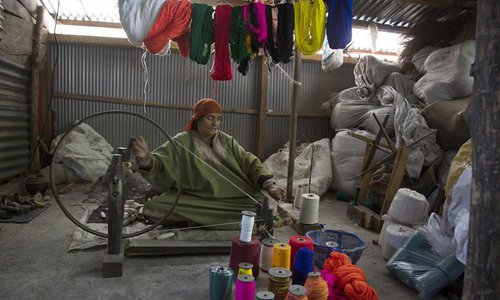HOME >> SOURCE
RCEP members move to resolve India's concerns
By Ma Jingjing Source:Global Times Published: 2019/12/5 19:48:40

A Kashmiri woman makes weaving threads for shawl-making at a village in Kulgam district, about 70 km south of Srinagar, the summer capital of Indian-controlled Kashmir, July 21, 2019. (Xinhua/Javed Dar)
Members of the Regional Comprehensive Economic Partnership (RCEP) are resolving problems that concern India in a way that satisfies all participants, a spokesperson for China's Ministry of Commerce (MOFCOM) said on Thursday.
China welcomes India to join the trade pact, and a technical legal review of the RCEP's text started this week in Jakarta, capital of Indonesia, spokesperson Gao Feng told a press briefing in Beijing.
Gao said that relevant RCEP members are discussing some remaining market entry problems and will maintain communications with India to address India's concerns so the South Asian country can join as early as possible.
During the 3rd RCEP Summit held in Bangkok, Thailand in November, 15 nations concluded text-based negotiations, with a formal signing expected in 2020.
But one important economy - India - declined to join the RCEP now, worried that the agreement may "put its domestic industry and agriculture at risk," Indian news site The Economic Times reported.
"The chance of India joining the RCEP depends on whether it can abandon its protectionist mentality," Chen Xiangmiao, a research fellow at the Hainan-based National Institute for the South China Sea, told the Global Times on Thursday.
Joining the free trade agreement will promote Indian exports to countries including South Korea, Japan and China, as well as drive investment in the South Asian country, Chen said, noting that the deal brings benefits to each country and the wider regional economy.
If Indian eventually joins the pact, the RCEP will become the world's largest free trade area, covering about 30 percent of global GDP and half of the world's population.
India needs to carry out reform in terms of upgrading its industrial sector, improving production efficiency and modernizing agriculture, which will be difficult for the country to do in the near future, Chen said.
Posted in: ECONOMY